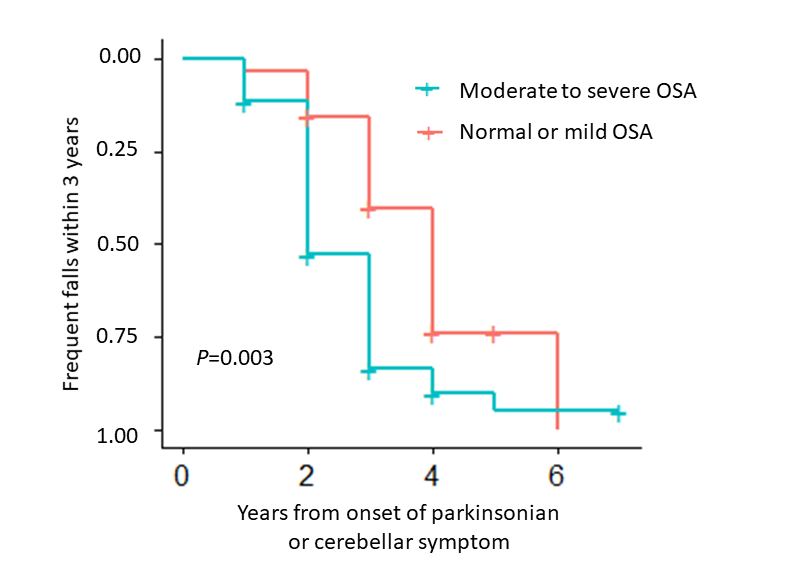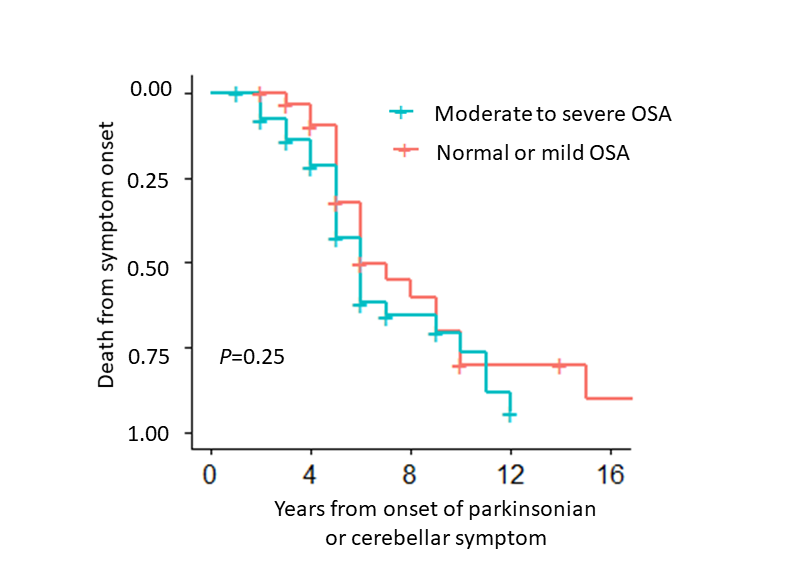Category: Parkinsonism, Atypical: MSA
Objective: We aimed to investigate the relationship between sleep apnea and survival or early frequent falls in patients with multiple system atrophy (MSA).
Background: Sleep-disordered breathing is frequently encountered nocturnal disorders in patients with MSA. Sleep-disordered breathing includes obstructive sleep apnea, central sleep apnea, sleep hypoventilation, and, stridor. Sleep apnea, as well as stridor, would contribute to poor prognoses, such as survival and early recurrent falls.
Method: Patients with probable multiple system atrophy who underwent polysomnography were enrolled in the prospective cohort at Asan Medical Center. Clinical information including baseline demographics, disease severity, autonomic dysfunction (orthostatic blood pressure change, residual urine), and polysomnographic features were collected. Survival and early frequent falls within 3 years from the onset of parkinsonism or cerebellar symptom were assessed. The patients were categorized into two groups: moderate to severe OSA (AHI ≥15, OSA group), normal or mild OSA (AHI <15, control group). The relationship between OSA and survival or early frequent falls was assessed by a Cox regression model.
Results: Among a total of 86 patients, 53 patients were in the OSA group and 33 patients were in the control group. For median five years of follow-up, 50 patients died. There were no significant differences in age at onset, sex, and disease severity between OSA and control groups (P=0.14−0.84). However, the decrease in orthostatic blood pressure was higher in the OSA group than in control group (mean ± standard deviation: 41.5 ± 21.1 vs. 29.3 ± 17.7, P=0.007). Patients in the OSA group were associated with early falls within 3 years from symptom onset (OR=2.13, 95% CI 1.26 − 3.58, P=0.003) compared with patients in the control group (Figure 1). However, survival in the OSA group was not significantly different from that in the control group (OR=1.45, 95% CI 0.81 − 2.60) (Figure 2). Obstructive apnea index was associated with early falls (OR=1.03, 95% CI 1.00 − 1.06, P=0.04), and early death (OR=1.05, 95% CI 1.01 – 1.01, P=0.008). Central apnea index and stridor were not associated with early falls, nor survival (P=0.47−0.97).
Conclusion: Obstructive sleep apnea might affect poor prognosis in patients with MSA, including early falls within 3 years from symptom onset and survival.
To cite this abstract in AMA style:
S. Jo, S. Lee, J. Lee, SA. Lee, SJ. Chung. Association between sleep apnea and prognosis in patients with multiple system atrophy [abstract]. Mov Disord. 2022; 37 (suppl 2). https://www.mdsabstracts.org/abstract/association-between-sleep-apnea-and-prognosis-in-patients-with-multiple-system-atrophy/. Accessed October 22, 2025.« Back to 2022 International Congress
MDS Abstracts - https://www.mdsabstracts.org/abstract/association-between-sleep-apnea-and-prognosis-in-patients-with-multiple-system-atrophy/


